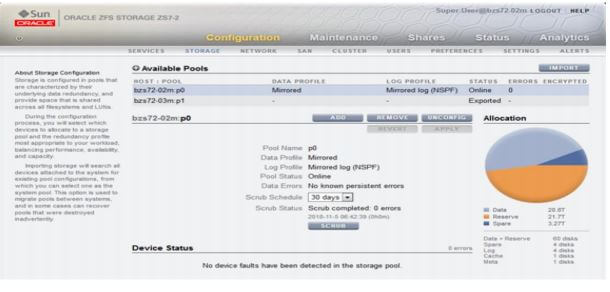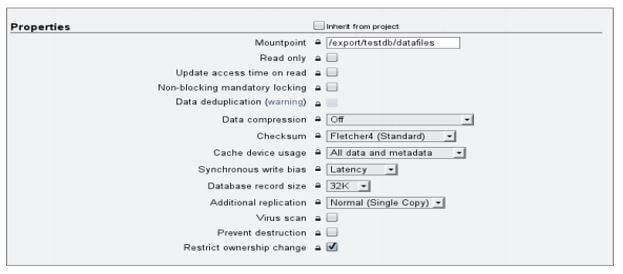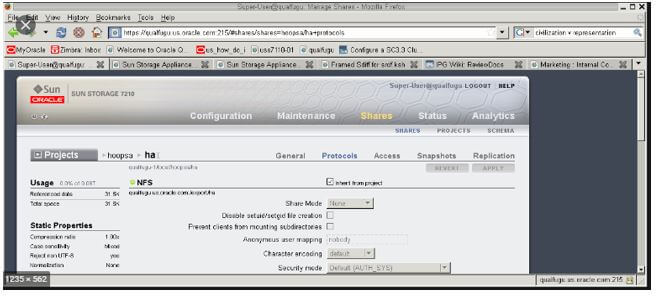Updated May 15, 2023
Introduction to Oracle ZFS
Oracle provides different storage machinery that is Oracle ZFS storage it provides the different functions to users such as consolidate file, store different data on a single platform. It combines all high resources with petabytes of capacity of storage, all users to run all workloads or we say jobs at high speed without any error. It also has a built in Oracle database integration, including automation prioritization of database, it enables IT departments to optimize the workload performance and minimize the administration to achieve low level cost of ownership that is TCO. It is a file system and logical volume manager as well as it is scalable.
Why do we Need an Oracle ZFS?
- Many organizations require a single platform that provides all functionality without any error with high speed and security.
- It provides the same kind of functionality to the user that means it provides the single platform to handle the different jobs at the same time, basically Oracle ZFS is a file system that means it is storage machinery is used to store different jobs in a cloud and provides a high performance with scalability and security.
- It also supports the DB like RAC as well as it provides protection against data corruption.
Working of Oracle ZFS
Given below is the working :
1. Principles and Design Goals of Oracle ZFS
The main goal of Oracle ZFS is to provide high performance with standard hardware as well as end to end data protection and simple management. Current Oracle ZFS storage machinery uses a 64 bit operating system to increase virtual memory space. It also includes the space layout system, which is helpful to hide the memory addresses from the attackers. It uses the 64 bit address space because it reduces pressure of virtual memory and increases the stability on a high loaded system as well as it also improves the flexibility.
All above mentioned features we include on Oracle ZFS storage machinery and it is capable of handling all jobs, to run jobs with data protection algorithms, advanced data services and manage all activity by using automation tools. That is the main reason the Oracle ZFS provides high performance and virtualization. It uses hardware more effectively during the workload.
2. Oracle ZFS Pooled Storage Model
Oracle ZFS pooled storage model means it is a collection of physical disk, ZFS utilizes the idea of capacity pools to oversee actual capacity. Truly, document frameworks were developed on top of a solitary actual device. To address numerous devices and accommodate information repetition, the idea of a volume supervisor was acquainted with giving a portrayal of a solitary device so that document frameworks shouldn’t be changed to exploit different devices. This plan added another layer of intricacy and at last forestalled certain record framework propels in light of the fact that the document framework had no influence over the actual position of information on the virtualized volumes.
3. Transactional Semantics
Oracle ZFS storage machinery always uses the transactional file system that means it always consists of disk. Traditional file systems overwrite the information that means if the framework loses the power for instance between the time and information block and when it is connected into an index, generally this problem we solve by using the fsck command. This command is useful to monitor all over activity such as checking document framework state and if any unwanted thing may happen during the interaction. In the transactional file system we manage all the data by using copy on write semantics.
4. Checksums and Self-Healing Data
Oracle ZFS is used to verify all data by using different checksum algorithms. In traditional file system checksum verification performed on a per block basis due to the volume management layer and design of traditional file system. In traditional file system writing blocks on incorrect locations without any checksum error, this is a problem in traditional file systems. But ZFS provides the checksum that detects failures and removes them correctly.
5. Unparalleled Scalability
A key plan component of the ZFS document framework is versatility that is the scalability. The file system by default uses 128 bit and it allows for 256 quadrillion of storage. Here we dynamically allocated all the data so there is no need to pre-allocate data.
6. ZFS Snapshots
The snapshot is a read only format of the file system. It can generate easily and quickly and there is no need for extra space in disk.
7. Simplified Administration
This is an important function of Oracle ZFS storage machinery, it provides the simple administration model to users. It properly inherits all functions and manages very well.
Advantages and Disadvantages of Oracle ZFS
Given below are the advantages and disadvantages mentioned:
Advantages:
- It runs all jobs fasters.
- It provides simple support to protect the cloud.
- It has a pooled storage feature.
- It also has a data integrity verification and automatic repair functionality.
- It has a maximum storage size of 256 quadrillion.
- It provides the data replication functionality to recover the data.
- It also provides security.
Disadvantages:
- It increases the difficulty in data recovery.
- Cost of Oracle ZFS storage machinery is high.
- It increases management complexity of workloads.
- It required more hardware.
- If any subsystem may mail then standalone operation may not be carried out.
Example
Given below is the example mentioned:
The Oracle ZFS has functionality to monitor all processes that the status of the current system as shown in below screenshot as follows.
Now let’s see how we can share the database in Oracle ZFS with different properties as shown in the screenshot below as follows.
Below screenshot shows how we can add new projects into the Oracle ZFS storage machinery as follows.
Usage
Given below is the usage:
- By using Oracle ZFS we can run applications and databases faster while multiple users access them.
- We can store large amounts of data and manage very well with protections.
- It has a data replication property so there is no chance of data loss.
- Basically it is used for data analytics with high bandwidth.
Recommended Articles
This is a guide to Oracle ZFS. Here we discuss the introduction, why do we need a Oracle ZFS? working, advantages, disadvantages, example & usage. You may also have a look at the following articles to learn more –






